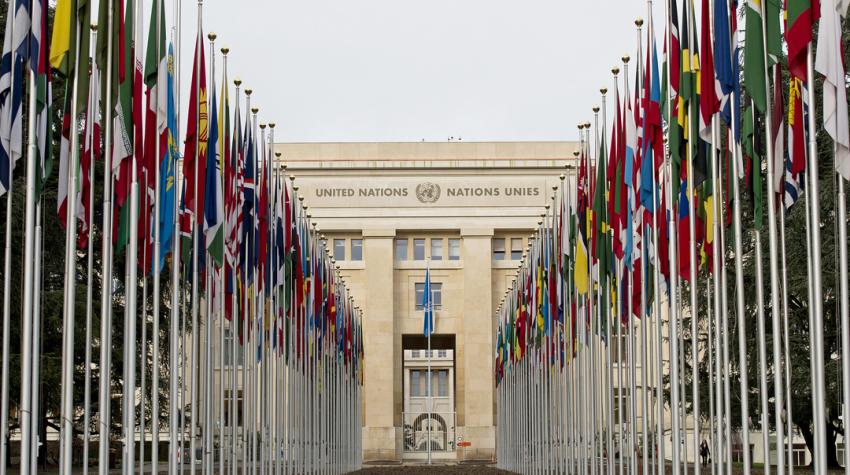The 55th round of the Geneva International Discussions (GID) – the multilateral forum to address security and humanitarian consequences of the Russo-Georgian War of August 2008 – were held on December 7-8 in the Palace of Nations.
Positions taken: Georgia
The Georgian Foreign Ministry stated the key discussion topics were the “intensified de-facto annexation process” of Russian-occupied regions, the release of arbitrarily detained Georgian citizens, and ensuring the freedom of movement along the occupation lines.
Tbilisi stressed that recent agreements between Russia and the Kremlin-backed authorities, including the common socio-economic space program with Abkhazia, aim to absorb the occupied regions into the Russian military, political, economic and social systems. According to the statement, Georgian Deputy Foreign Minister Lasha Darsalia highlighted that Russia, through these actions, unlawfully attempts to change the borders of a sovereign state in Europe.
The Georgian delegation also raised concerns over militarization of the occupied regions, illegal military drills, violations of Georgian airspace, erection of barbed wire fences and artificial barriers on the dividing lines. The Foreign Ministry stated that Tbilisi also denounced “Moscow’s provocative statements on delimitation-demarcation” on the occupation line.
While reaffirming Tbilisi’s commitment to non-use of force, the Georgian Deputy FM assessed illegal “borderization” and abductions of Georgian citizens as the use of force and threat of use of force on part of Russia. Tbilisi called on Moscow to uphold its responsibilities as per the 2008 EU-mediated ceasefire agreement.
Concerning the humanitarian situation, Tbilisi raised the issue of discrimination against ethnic Georgians in both occupied regions, their inability to receive education in their native language, and the violation of their property rights.
Tbilisi also demanded the release of Irakli Bebua, an arbitrarily detained Gali Georgian and reiterated the call to deliver justice in the murder cases of Archil Tatunashvili, Giga Otkhozoria, and Davit Basharuli.
The Georgian FM expressed hope for restoring the Incident Prevention Gali Incident Prevention and Response Mechanism, suspended since June 2018 over the Otkhozoria-Tatunashvili list.
The Georgian Foreign Ministry said that the participants from Moscow, Sokhumi and Tskhinvali politicized the topic of safe and dignified return of internally displaced persons to their homes in Abkhazia and Tskhinvali Region, and left the discussion.
Positions taken: Russia, Sokhumi, Tskhinvali
The Russian Foreign Ministry (MID) said that the Russian side reiterated its call that Tbilisi, Sokhumi, and Tskhinvali should sign a legally binding agreement on guaranteeing the non-use of force.
According to the Foreign Ministry, the relevance of such a document is “significantly increasing, given the intensive military training activity of the United States and NATO” in Georgia and the Black Sea.
The Foreign Ministry also said that Sokhumi has taken steps aimed at the earliest possible resumption of the Gali IPRM. Moscow, with the support of Sokhumi and Tskhinvali, stated however that a real contribution to the security would be the delimitation-demarcation of the occupation lines.
Calling Georgia’s annual UN resolution on the return of IDPs “highly politicized,” the Russian side stated consideration of this document in the UN without the Kremlin-backed authorities “continues to block the discussion of this issue in the Geneva format.”
According to the Abkhaz “foreign ministry” Sokhumi expressed its readiness to resume the Gali IPRM and put forward several proposals to do so.
Sokhumi also shared concerns over “Georgia’s military buildup” with the support of the U.S. and NATO, highlighting Georgia’s prospects for joining NATO, regular visits of warships to the Black Sea and “constant violation of airspace of Abkhazia by foreign civil and military vessels.”
According to Tskhinvali-based RES news agency, S. Ossetian participants raised the issue of Georgian police observation post in the Chorchana-Tsnelisi, claiming has an “extremely negative impact on the state of affairs.”
GID Co-Chairs’ assessment
The GID Co-Chairs said participants “engaged in frank exchanges on outstanding issues such as freedom of movement, documentation, and travel abroad, detentions, unresolved missing persons cases, and specific security concerns in localized areas.”
However, “despite constructive engagement” on several humanitarian issues, the statement followed “a discussion on the core issue of internally displaced persons and refugees could not take place due to a walkout by some participants.”
Welcoming the ongoing operations of the Ergneti IPRM, the GID Co-Chairs noted “positive signals on the potential resumption of the Gali IPRM.”
The Co-Chairs called on all participants to increase efforts to build trust and confidence, to constructively”engage in technical-level discussions, and with international humanitarian and human rights organizations.
Read Also:
- Geneva Talks Co-Chairs Visit Tbilisi, Sokhumi, Tskhinvali
- 54th Round of Geneva International Discussions
This post is also available in: ქართული (Georgian) Русский (Russian)

